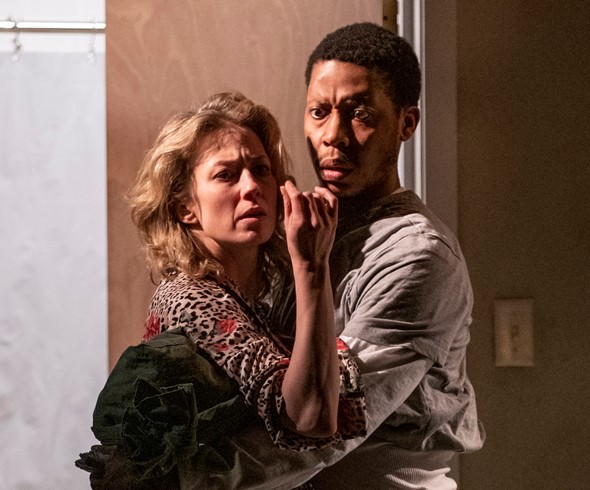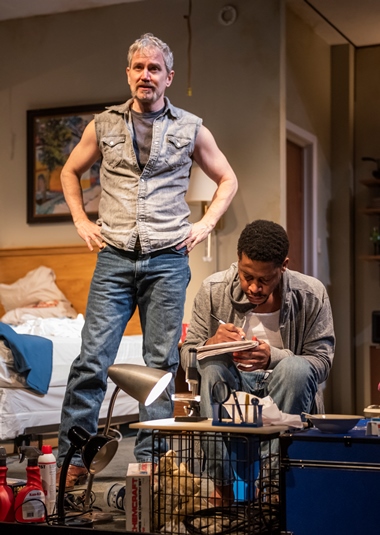‘Bug’ at Steppenwolf: The creepy little spies are everywhere. (But you must look closely.)

Is that a bug they see before them? Agnes (Carrie Coon) and Peter (Namir Smallwood) think it is, in Tracy Letts’ “Bug” at Steppenwolf Theatre. (Michael Brosilow photos)
Review: “Bug” by Tracy Letts, directed by David Cromer. At Steppenwolf Theatre, extended through March 15. ★★★
By Lawrence B. Johnson
The first impression of Tracy Letts’ bleakly comic play “Bug” is visual, wordless: a young woman, her back to the audience, stock-still and staring out the open doorway of her dumpy motel room. It’s a telling image. We have just met Agnes, a solitary, empty vessel who’s about to be filled with a surreal and lethal form of paranoia.
Remarkably enough, though Letts is a longtime ensemble member at Steppenwolf, the current production is the company’s first staging of “Bug,” which had its premiere in London in 1996 and opened for the first time in Chicago five years later at A Red Orchid Theatre. It’s pretty raw stuff, as grim as it is bizarre, like watching two souls caught in a drainage swirl, plunging toward oblivion.

R.C. (Jennifer Engstrom, center) introduces new acquaintance Peter (Namir Smallwood) to her friend Agnes (Carrie Coon).
At least in the beginning, there’s nothing paranoid or even especially weak about Agnes (played with an initial, credible aura of exhaustion and driven loneliness by Carrie Coon). If Agnes, at the onset of middle age, is vulnerable, she’s also tough enough to keep slugging forward on her own, working as a waitress in welcome isolation from an abusive husband who’s doing time for armed robbery.
Then along comes Peter, an ex-soldier (or maybe still a soldier) who shows up with Agnes’ friend R.C., a flinty lesbian biker (Jennifer Engstrom) who met Peter and decided to bring him along for drinks and some laughs. When R.C. calls it a night, Peter asks Agnes if he might stay over, sleep on the floor, just for the night. She says sure. This is really where the tale begins.

Agnes’ husband (Steve Key) doesn’t know what to make of Peter (Namir Smallwood) and his microscopic studies.
As they get to know each other a bit, Peter (the ever calm but knowingly intense Namir Smallwood) reveals that he’s probably being watched – that before his release from the army, he was the subject of experimentation in which he was injected with bug larvae that would develop under his skin, making him trackable. He also shows Agnes an example of what he’s talking about, a tiny bug he plucks from his scalp. It’s extremely small; she’s not quite sure she can see it. Maybe.
Peter stays on the next day. From somewhere, he produces a microscope and begins examining the little critters more closely. Now Agnes is fairly confident that she, too, can see them. Yes, definitely.
Meanwhile, the phone keeps ringing, but there’s never anyone on the other end of the line. And Meanwhile II, Agnes’ dangerous looking spouse (Steve Key) shows up, observes Agnes’ little improv domestic scene, finds her purse and lightens it and leaves again. And Meanwhile III, the boy-girl in a motel room thing happens; and with that out of the way, clothing becomes dispensable and so is dispensed with, and the now intimate Agnes and Peter play an extended scene au naturel. Quite.
Peter keeps escalating his conspiracy cant, which burgeons into rant. At one point, he and his new resistance partner Agnes cover the walls and ceiling, doors, everything with foil to prevent electronic surveillance – or it may be to keep the bugs from transmitting their signals; a sound precaution, either way. (The annoying husband has another walk-on, no more consequential than the first, and that’s it for him. R.C. also pops in again, lest we think Letts has forgotten her. But let’s let that be.)

The first impression of “Bug” at Steppenwolf is wordless: a young woman (Carrie Coon), stock-still and staring out the open doorway of her dumpy motel room.
With Agnes now wholly committed, the frantic, fearful twosome race pell-mell into hysteria. We sense a bad end coming. That’s when the psychologist Dr. Sweet (Randall Arney) knocks at the door. He offers Agnes a spot-on profile of Peter’s potentially homicidal psychosis. When Peter takes issue with the doctor’s analysis, the two men have a heated, rather one-sided conversation until the doc makes his exit.
And so the obsessed lovers face their end game. Do they make a break for it, or just hunker down and wait for the next knock at the door? But there’s a larger question: How do they get rid of the bugs once and for all? To vanish from those infinitesimal piercing eyes: ’Tis a consummation devoutly to be wished. Thus does necessity become the spark of invention.
Related Link:
- Performance location, dates and times: Details at TheatreInChicago.com

